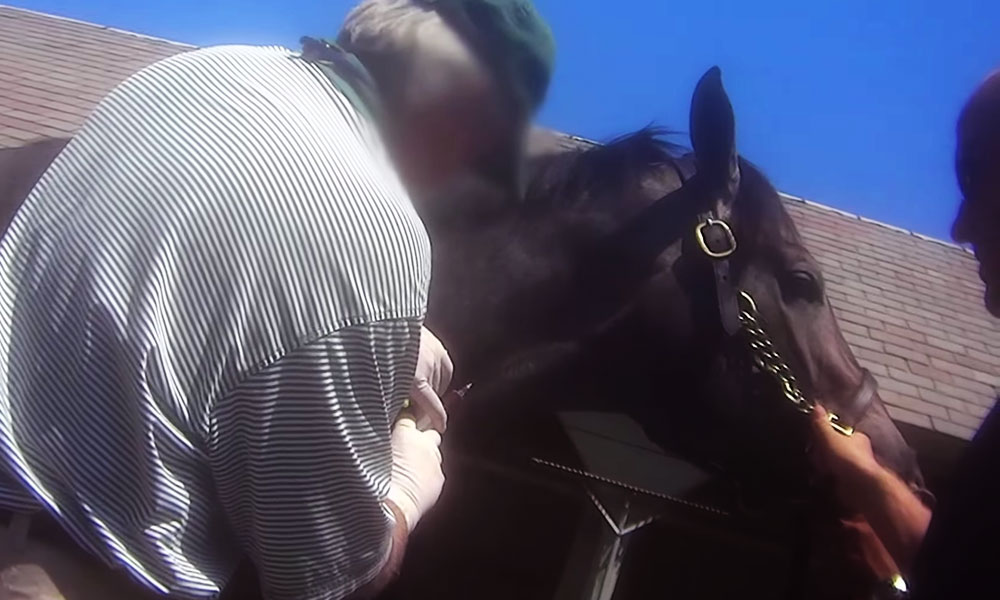
Horse Racing Groups Denounce Top Trainer Over Animal Mistreatment
Days ahead of the Kentucky Derby, horse racing is facing a scandal that could change the face of the game forever after a PETA exposé appeared to show trainer Steve Asmussen's team using inhumane medical treatments to make his horses go faster. Organizations are pushing for new regulations, but they face challenges in enacting reforms across the board.
The NBA isn’t the only professional sport facing a crisis of conscience at the moment.
With the Kentucky Derby just days away, one of horse racing’s most decorated trainers, Steve Asmussen, is facing serious questions from the sport over allegations that he mistreated his animals. And with one of his horses, Tapiture, among the favorites to win on Saturday, organizations in the horse-racing world could find themselves dealing with difficult questions if Asmussen’s horse takes the top spot.
[W]e will not defend or condone any proven cases of abuse or neglect.
More details on the allegations below:
An undercover exposé: In March, People for the Ethical Treatment of Animals (PETA) released a video purporting to show Asmussen’s team using inhumane means to get more out of horses, including using electric shocks and administering drugs to the animals for nontherapeutic reasons. The video, shot by a PETA investigator who worked with Asmussen’s team for four months, purports to show the trainer’s team doing those things to get the horses to run faster. “We wanted to know exactly what happens to thoroughbreds in a top racing stable,” PETA Senior Vice President Kathy Guillermo told The New York Times. “It was devastating to see sore, exhausted, drugged horses every single day. Some were in so much pain it hurt them even to stand, yet they were trained and run anyway.” The video shows Nehro, a horse that finished second in the 2011 Kentucky Derby, just days before he died of colic.
A strong reaction: In the wake of the Times story and the PETA video release, a number of associations tied to horse racing, led by the National Thoroughbred Racing Association, both denounced the story and defended the actions of the industry as a whole. “While we have not been given the opportunity to review most of the documents referred to in the story, we will not defend or condone any proven cases of abuse or neglect,” the groups wrote. “The attitudes and actions alleged in the story are not representative of the overwhelming majority of participants in our sport who care deeply for the horses they own or train and conduct their business affairs in compliance with all applicable laws and regulations.”
“The dark cloud hovering over our sport”: In comments released this month by Jockey Club Chairman Ogden Mills Phipps, the association sided against Asmussen’s alleged practices, which Phipps characterized as unsportsmanlike, and pushed for strong regulations to ensure greater horse safety. Phipps’ suggestions include building a formal tie between horse racing and U.S. Anti-Doping Agency (USADA). “I propose that veterinary records of every horse entered in this year’s Triple Crown races be made immediately available,” Phipps wrote. “The New York State Gaming Commission does this, but only for a three-day period from the day of the race. I suggest a much longer period: 14 days.” Phipps went so far as to recommend that Asmussen stay home instead of going to Churchill Downs this week.
Despite the denouncing and regulatory pushes, the groups can do little at this juncture to mandate rules, The Wall Street Journal notes. With no overarching industry body to regulate the sport in the way one would in the NBA or MLB, states often play a role in regulating the sport, leading to a patchwork of rules.
But if Asmussen’s horse wins on Saturday—the trainer, who isn’t dropping out, remains defiant—it could put an even darker shadow on the sport.
A trainer in a PETA video, purportedly shown injecting drugs into a racing horse. (YouTube screenshot)






Comments